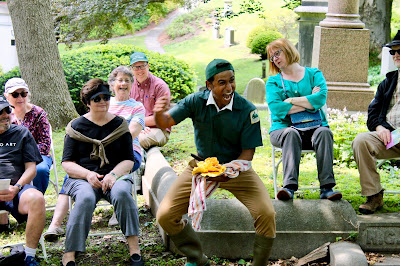 |
| Jacob Athyal showing fungal gold in Sworn to Secrecy at Mount Auburn Cemetery |
For a profession where we're supposed to be interested in honest conversation and diving deep into human questions that can make audiences squirm, playwrights are remarkably uncomfortable talking about money. We're pretty chickenshit about it, actually.
A century ago, playwrights chose to be represented by a trade association rather than a union. Which means that we own our own copyrights (unlike screenwriters, who are represented by a union), and we are generally self-employed. But that independence comes at a cost--we don't have guaranteed minimum weekly wages like Equity actors or screenwriters represented by the WGA. Instead we need to negotiate our contracts and wages. Indeed, the Dramatists Guild, as I understand it, is prohibited from publishing a recommended amount for commissions or royalties, but instead can only advise on industry norms. (The Guild is awesome. If you're a playwright, you should join.)
Which makes it all the more imperative for playwrights to share information, on their own, even informally, about how much they're making for royalties, commissions, etc. Without knowledge of the market, we're left in the dark when we negotiate contracts with producers and theaters. When it comes to negotiations, money is power.
By cloaking the economic realities of our field, we do a tremendous disservice to writers who are new to playwriting. They have no idea what to expect. I encourage anyone who has a passion for writing plays to give it a try, but if they want to make this a gig that takes up most or all of their time, they should know the financial realities of how much they might make, and not just when they have a big hit, as well as what it costs to be a playwright (travel, memberships, tickets, etc.)
So, here is my little bit of financial data. I would worry that it could feel like bragging, but surely hauling in a whopping $11,000 annual net income isn't a sign of grand success for a grown adult who's been at this for 30 years. At the same time, I'm incredibly grateful for the money I've earned and that I can contribute at least something meaningful to my family. (And we do have this barn project that's going to take at least $50K in fixup costs to complete...)
And yes, we write because we love to create plays. No one gets into theatre for the money. But theatre is a business, and just like actors and designers and directors and administrators, playwrights need to buy groceries and diapers and pay rent. Let's do this with as much openness and information as possible.
 |
| Lisa Tucker and Ed Hoopman in Cerulean Blue at Mount Auburn Cemetery |
Gross Income: $19,511
published plays, performance royalties and advance: $980
play production royalties: $3,364 (for unpublished work--more than $2,500 was from Cato & Dolly)
film projects: $0
play commissions: $10,750 (Mount Auburn artist-in-residence stipend)
teaching/coaching: $1,362
my novels: $215
Prizes/fellowships: $0
Plays in Place: $2,000
misc. (essays, panels, editing, other): $840
Expenses: about $7,500 (includes mileage expenses)
This includes $740 in theatre tickets, $250 in research materials, and $1,300 in travel.
Net Income: $11,761 (before taxes)
Past years:
2018: Gross Income: $23,192 Expenses: $14,227 net: $8,965
2017: Gross Income: $31,343 Expenses: $9,715 net: $21,628
2016: Gross Income: $25,857 Expenses: $11,472 net: $14,385
2015: Gross income: $8,662 Expenses: $4,979 net: $3,682
2014: Gross income: $7,974 Expenses $5,580 net: $2,494
2013: Gross income: $7,767 Expenses: 5,758 net: $2,029
2012: Gross Income: $3,844 Expenses: $2,808 net: $1,063
2011: Gross Income: $2,638 Expenses: $4,665 net: $-2,027
For 2020, my goal is to get my net income to be at least $12,000. I don't have quite enough productions and commissions lined up for that to happen yet, but I sure am working on it. I'll definitely need to continue to reduce my expenses in order to reach my goals.
Plays in Place projects will count for a big part of my income in 2020. The Plays in Place 2020 budget was close to $100,000 (more if you count my artist-in-residence stipend), and I think we can possibly stay steady for 2020 (almost all of that money goes to artist salaries).
Coming Next: Writing by the Numbers 2019: Time
 |
| I want to develop new plays at this barn in Northampton, MA, but I need to earn some fixup money first. |

No comments:
Post a Comment